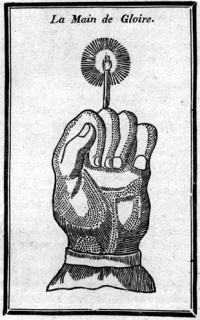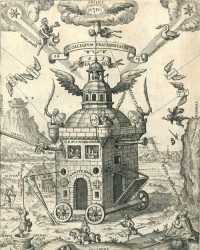Occult
From The Art and Popular Culture Encyclopedia


Illustration to the Speculum Sophicum Rhodostauroticum (1618) by Teophilus Schweighardt Constantiens
|
"'For Sinistrari d'Ameno,' observed Durtal, "'the incubi and succubi are not precisely demons, but animal spirits, intermediate between the demon and the angel, a sort of satyr or faun, such as were revered in the time of paganism, a sort of imp, such as were exorcised in the Middle Ages. Sinistrari adds that they do not need to pollute a sleeping man, since they possess genitals and are endowed with prolificacy.'"--Là-Bas (1891) by Joris-Karl Huysmans "Ideas enter our above-ground culture through the underground. I suppose that is the kind of function that the underground plays, such as it is. That it is where the dreams of our culture can ferment and strange notions can play themselves out unrestricted. And sooner or later those ideas will percolate through into the broad mass awareness of the broad mass of the populace. Occulture, you know, that seems to be perhaps the last revolutionary bastion." -- Alan Moore "He began by turning over all his Latin library, after which he re-marshalled the special works of Archelaüs, Albertus Magnus, Raymond Lully and Arnaud de Villanova treating of the kabbala and the occult sciences; lastly he verified, one by one, his modern books and was delighted to find they were all intact, dry and in good condition."--À rebours (1884) by Joris-Karl Huysmans |
.png)
_by_Annie_Besant_&_Charles_Webster_Leadbeater.jpg)
|
Related e |
|
Featured: |
The word occult comes from the Latin occultus (clandestine, hidden, secret), referring to 'knowledge of the hidden'. In the medical sense it is used commonly to refer to a structure or process that is hidden, e.g. an "occult bleed."
Occultism
Occultism is the study of occult or hidden wisdom. To the occultist it is the study of "Truth", a deeper truth that exists beneath the surface: 'The truth is always hidden in plain sight'. It can involve such subjects as magic (alternatively spelled and defined as magick), alchemy, extra-sensory perception, astrology, spiritualism and numerology. There is often a strong religious element to these studies and beliefs, and many occultists profess adherence to religions such as Gnosticism, Hermeticism, Luciferianism, Thelema, and Neopaganism. While Christianity, Judaism, Hinduism, Buddhism, and Islam are generally not considered occult, some of their modern interpretations can be, as the interpretation of Hinduism within Theosophy or the various occult interpretations of the Jewish Kabbalah. Orthodox members of such religions are likely to consider such interpretations false.
The word "occult" is somewhat generic, in that almost everything that isn't claimed by any of the major religions can be considered the occult. Even religious scientists have difficulties in defining occultism. A broad definition is offered by Nicholas Goodrick-Clarke:
"OCCULTISM has its basis in a religious way of thinking, the roots of which stretch back into antiquity and which may be described as the Western esoteric tradition. Its principal ingredients have been identified as Gnosticism, the Hermetic treatises on alchemy and magic, Neo-Platonism, and the Kabbalah, all originating in the eastern Mediterranean area during the first few centuries AD."(Goodrick-Clarke, The Occult Roots of Nazism (1985))
From the 15th to 17th century, these kinds of ideas that are alternatively described as Western esotericism had a brief revival. Alchemy used to be common among highly important seventeenth-century scientists, such as Isaac Newton and Gottfried Leibniz. Isaac Newton was accused of introducing occult agencies into natural science when he postulated gravity as a force capable of acting over vast distances. This revival of alchemy and other occult studies was halted by the triumph of empirical sciences and the Age of Enlightenment. "By the eighteenth century these unorthodox religious and philosophical concerns were well defined as 'occult', inasmuch as they lay on the outermost fringe of accepted forms of knowledge and discourse," (Goodrick-Clarke, 1985) and were only preserved by a few antiquarians and mystics. However, from about 1770 onwards, a renewed desire for mystery, an interest in the Middle Ages and a romantic temper encouraged a revival of occultism in Europe, "a reaction to the rationalist Enlightenment." (Goodrick-Clarke, 1985)
Based on his research into the modern German occult revival 1890-1910, Goodrick-Clarke puts forward a thesis on the driving force behind occultism. Behind its many varied forms apparently lies a uniform function, "a strong desire to reconcile the findings of modern natural science with a religious view that could restore man to a position of centrality and dignity in the universe.
That the Kabbalah has been considered an occult study is also perhaps because of its popularity among magi (the biblical wise men who visited the Infant Jesus are said to have been magi of Zoroastrianism) and Thelemites. Kabbalah was later adopted by the Golden Dawn and brought out into the open by Aleister Crowley and his protégé Israel Regardie. Since that time many authors have emphasized a syncretic approach by drawing parallels between different disciplines.
Direct insight into or perception of the occult does not usually consist of access to physically measurable facts, but is arrived at through the mind or the spirit. The term can refer to mental, psychological or spiritual training. It is important to note, however, that many occultists will also study science (perceiving science as an adjunct to Alchemy) to add validity to occult knowledge in a day and age where the mystical can easily be undermined as flights-of-fancy. An oft-cited means of gaining insight into the occult is the use of a focus; a physical object, a ritualistic action (for example, meditation or chanting), or a medium in which one becomes wholly immersed. These are just a few examples of the vast and numerous avenues that can be explored.
Occult fiction
- Examples
- In 1670, the Abbé Nicolas-Pierre-Henri de Montfaucon de Villars publishes The Count Of Gabalis.
- Russian science fiction and fantasy, see Vera Zhelikhovsky's occult fiction.
- The most popular contemporary writer of occult fiction is Dan Brown.
- Foucault's Pendulum was there for the thinking man
See also
- Occulture
- Occultism chronology by Jeffery Howe
- Ariosophy
- Esotericism
- List of magical terms and traditions
- Magic (paranormal)
- Nazi occultism
- Spiritualism
- Theosophy
- Witch
,_Utriusque_cosmic_maioris_scilicet_et_minoris_metaphysica.jpg)

